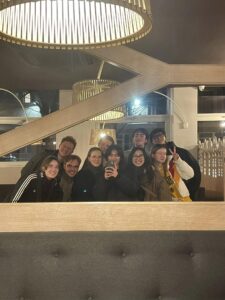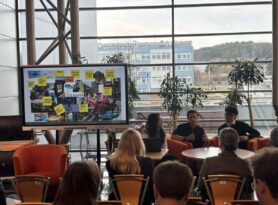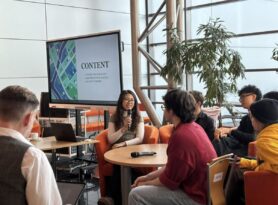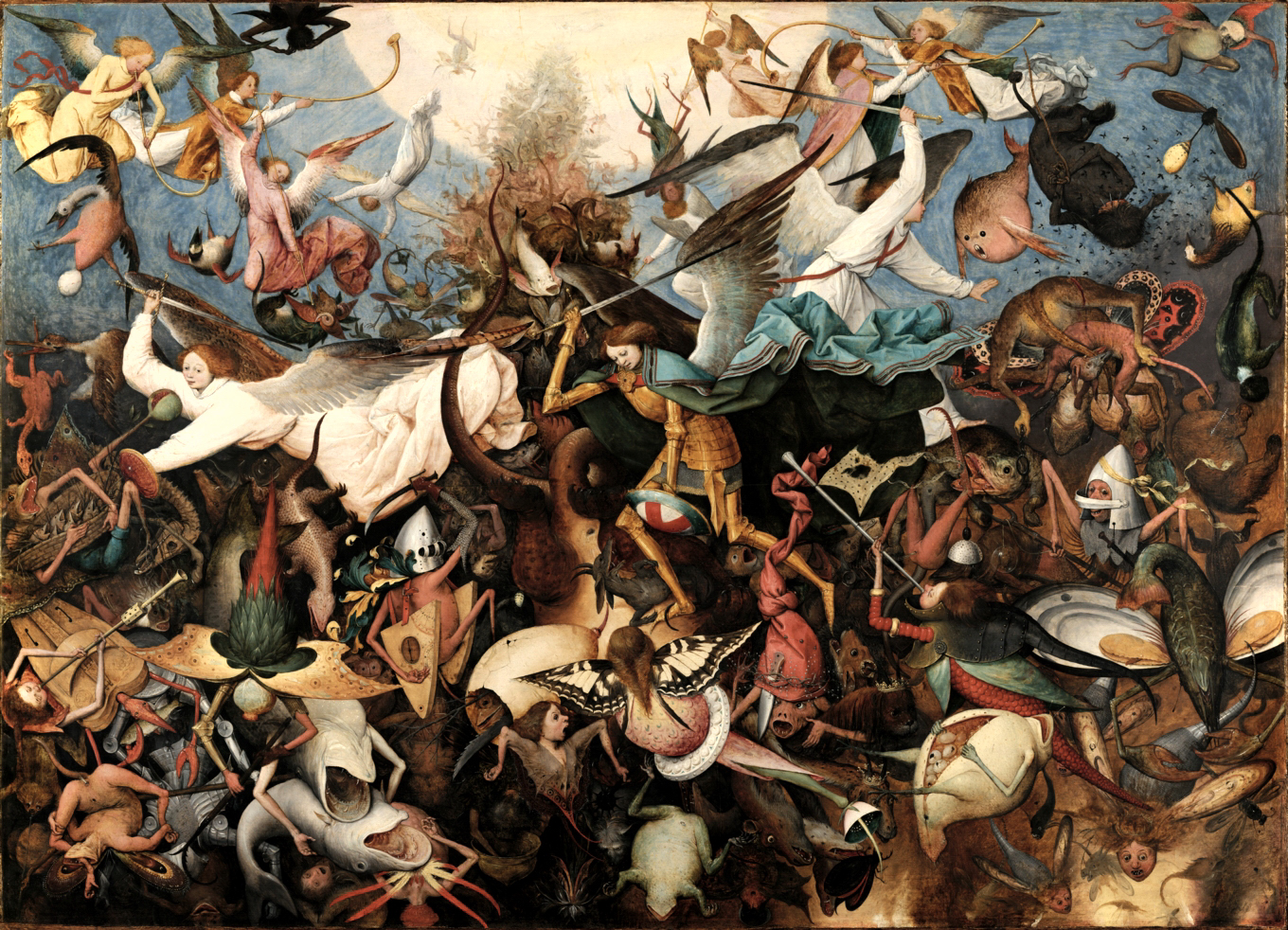Actualiteit
More-than-Human Humanities Honours Trip to Gdànsk
By Alya Khairunnisa, Sven Nome, Anna Ratkovich and Sonny Ngo
On Monday, 11th of November, HHP students from the department of Media and Culture studies received an invitation from its coordinator Rick Dolphijn to attend the opening of the More-than-Human Studies Lab Programme of the Centre for Sustainable Development, a collaboration between the University of Gdansk and Utrecht University. The proposition detailed the lab’s grand opening; a symposium with scholars, speakers, and artists from all over the world – as well as the possibility of Humanities Honours Programme students’ involvement. Provided with some background information regarding the history of the city, rundown of the event, and ideas for activities in line with the theme; we – Alya, Anna, Sonny, and Sven – agreed to take part in organising the excursion.

Firstly, we conducted our own research regarding the historic, on-theme, and interesting places that we can visit in the city of Gdansk; then gathered to see which ones are plausible to visit within our timeframe and budget. After some meetings and advice from the students of the University of Gdànsk, we settled on two exhibitions in the Solidarity Museum, and provided some free time for our participants to explore based on their own interests. Secondly, while waiting for our financial proposal to be approved, we sent out an invitation and registration form to the groupchat of the HHP students regarding our project and activities. Eventually, we secured the funding and decided on a group of six students from varying different study programmes to join our excursion.
On the first day, we gathered in the Schipol Airport to catch the two-hour flight to Gdànsk; passing the time by getting acquainted with each other. After landing and a one-hour bus to the city, we checked into our quaint hostel just a few-minutes walk away from the main train station. After providing the participants with time to rest and unpack their bags, we grabbed dinner at a nearby place that served authentic Polish dumplings. Not wanting to waste our first day by doing just that, we walked around the old town neighborhood of the city. During the quiet evening, we enjoyed the almost-empty streets, historic architecture, watched the residents enjoy their dinner, and received some fun facts regarding the city before eventually returning to our rooms to rest.
Our second day in Gdansk started with a visit to the University of Gdansk where we were welcomed by dr. Irena Chawrilska. Back in the Netherlands, we had become acquainted with the professor through video calls in which we discussed the set up of the programme. Here, she introduced us to Polish students who would take us through campus. We exchanged our ideas, interests, and generally, just got to know them a little bit more. We had only ever spoken once through a team-meeting and we had exchanged some email chains, so it was great that we could connect with one another.
Together, we planned to compare and showcase various student experiences with the concept of the More-than-Human at the conference. The Polish students were kind enough to introduce us to local hallway dwellers, who themselves were kind and curious enough to share their findings on the concept. In the end, we compared how the University of Utrecht and the University of Gdànsk interacted with the More-than-Human and how different disciplines could study the anthropocene. After we had conducted these interviews, we walked towards various museums in the city – though most prominently: the European Solidarity Centre.

When we arrived at this museum, a few of us had an interesting conversation with another visitor about various concepts, such as liberty and solidarity, while the others were walking around the building. After this, we all entered the exhibition together, accompanied by an audio guide. In the exhibition, we learned more about Gdànsk’s history and the role of the Solidarity movement within the city, the country and the world. The building itself is located within the shipyard of Gdànsk, which places you within the story told in the exhibition when looking over the shipyard from the rooftop at the end of it. After this interesting and informative trip to the European Solidarity Centre we met up with the students again at a restaurant to talk and eat pierogi —a traditional Polish dish — together.
On our third day in the city, we attended the symposium given at the University of Gdànsk to celebrate the opening of the More-than-Human Study Lab. After the introductory speeches by the representatives of University of Gdànsk, two professors gave presentations about their research projects. The first presentation was given by Alex Taek-Gwan Lee, a professor from Kyung Hee University in South Korea. The research proposed to regard weak technologies — the technologies that are understood as those adapting to the existing conditions instead of disrupting them — as complex, collaborative interplay between users, systems, environments, and creators. After a Q&A break, a presentation was given by Rick Dolphijn from Utrecht University. Redefining solidarity to extend its link to a non-human world and explore its ecological perspective, professor Dolphijn theorised new forms that solidarity would take in a changing world — the idea of ‘More-than-Human’ city being one of them.
After listening to the professors’ various interesting research projects, it was our turn to present our ideas and experiences in relation to the topic of the symposium: the More-than-Human. We gave a thirty minute presentation in which we talked about different topics, such as the ‘More-than-Human’ city course some of us followed last year, a research seminar project some of us took part in (relating to sound as a more than human entity) and a comparison between Gdànsk and Utrecht from a More-than-Human perspective. When we were done, we got some engaging questions and thoughts from the audience, followed by some discussions. As the final part of the symposium, some of the professors had a discussion to wrap it up, where they collectively discussed their findings, hopes for the future, and research opportunities to come.
 The symposium gave us an opportunity to compare the experiences of ecological approaches and educational practices in this sphere through an environment different from that of our own. After the symposium, we took time to explore the city of Gdánsk further, visiting its historical center. For the final part of the day, we attended a karaoke evening at one of the student campuses to meet up with our colleagues from the University of Gdànsk once more. The experience of being part of the local student community for an evening was exciting, and we thank our fellow student peers for their hospitality.
The symposium gave us an opportunity to compare the experiences of ecological approaches and educational practices in this sphere through an environment different from that of our own. After the symposium, we took time to explore the city of Gdánsk further, visiting its historical center. For the final part of the day, we attended a karaoke evening at one of the student campuses to meet up with our colleagues from the University of Gdànsk once more. The experience of being part of the local student community for an evening was exciting, and we thank our fellow student peers for their hospitality.
On the day of travelling back to The Netherlands, we had a collective breakfast with all Utrecht University participants to then briefly experience the city individually. With members of our group visiting various sites interesting to them — such as local shops and historical landmarks — we each received an opportunity to wrap up the trip with what appeals to us most. Taking a flight to Amsterdam in the afternoon, we concluded the trip on the evening of February 1st carrying educational insights and fun experiences back home with us. Indeed, our trip successfully combined academia and entertainment, and we are grateful for this opportunity provided by the Honours Programme, Rick Dolphijn, and the University of Gdànsk. We are grateful to all of our student colleagues from Utrecht and Gdànsk, too — and we are looking forward to the research developments in the area of More-than-Human.

